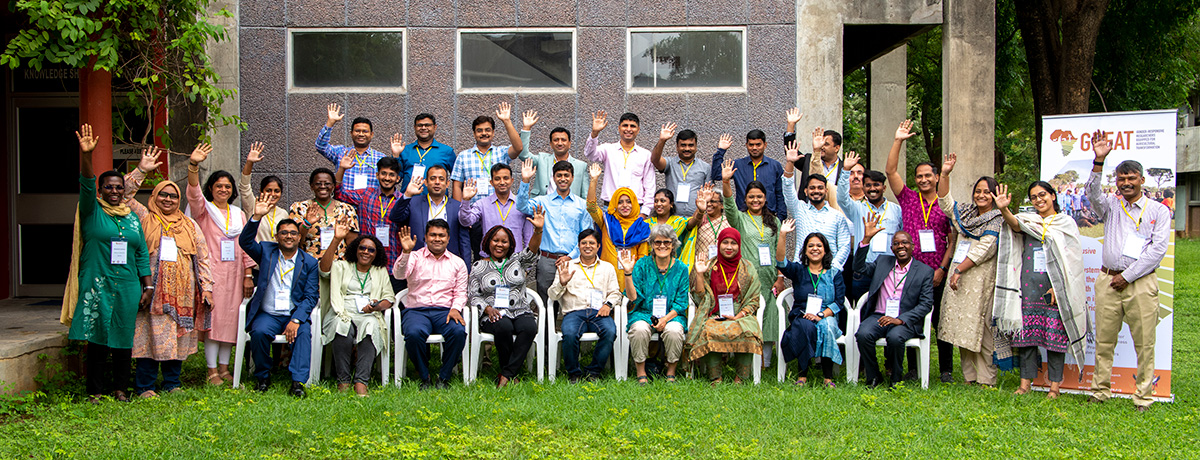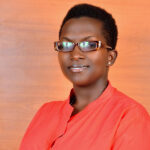
In September, 27 agricultural scientists from South Asia joined GREAT’s growing community of gender-responsive researchers.
The two-part Gender-responsive Plant Breeding and Seed Systems course for South Asia took a blended training approach, with virtual lessons as well as in-person workshops in Hyderabad, India. Part 1, hosted by the evidence module of the Generating Evidence and New Directions for Equitable Results (GENDER) Platform at the ICRISAT campus from Sept. 12-17, provided trainings for biophysical and social scientists. Part 2 targeted social scientists and was held virtually Sept. 26-30. The course was attended by 27 participants (7 women, 20 men; 16 biophysical scientists and 11 social scientists) from three countries- India, Nepal and Bangladesh.
Unlike previous GREAT Courses where participants were admitted as teams, the model for this course allowed individual applicants as well as team applicants from across South Asia.
Course participants came from 11 institutions in five categories:
- National Agricultural Research Systems: India, Nepal and Bangladesh;
- CGIAR Centers: International Rice Research Institute, The International Maize and Wheat Improvement Center (CIMMYT), The International Center for Agricultural Research in the Dry Areas (ICARDA), World Vegetable Centre;
- Academia: Banaras Hindu University India and Institute of Agriculture and Animal Science (IAAS), Tribhuvan University(TU)
- Public Sector: Ministry of Agriculture and Livestock, Nepal
- Private Sector: Orbi Seed Company
Purpose of the course
Part 1 focused on creating awareness of gender and the value of its integration in plant breeding and seed systems, and to equip learners with knowledge of tracking gender equality outcomes and communicating gender research. Part 2 equipped social scientists with knowledge on methods and tools for conceptualisation, design and implementation of rigorous/high quality gender research and transformative development projects.Professor Margaret Najjingo Mangheni, GREAT Co-PI at Makerere, congratulated the participants upon selection into the program during her opening remarks. She hailed them for their desire to transform their research programs to be more gender-responsive.
We applaud you for applying for this [gender-responsive plant breeding and seed systems] course. This means that you are interested in transforming your plant breeding and seed systems programs, and committed to the subject of gender responsiveness and gender equality,” said Professor Mangheni.
Trainers were drawn for Makerere University, Uganda; Cornell University, USA; private consultant from Germany, and experts from South Asia. “We draw on trainers from the region in order to share lived experiences with gender as well as give the course a face of the region,” Mangheni said.
Dr Ranjitha Puskur, the leader of the evidence module of the CGIAR GENDER Platform, highlighted linkages with the GREAT program and underscored the importance of gender inclusion in plant breeding and seed systems research programs. She intimated that GENDER Platform works with researchers across CGIAR and partners to set directions to have maximum impact on gender equality, opportunities for youth and social inclusion in agriculture and food systems integrating gender into crop breeding helps breed products that reach more users and creates better social impact.
“One of the things we do at the GENDER Platform is to synthesize evidence, and clearly, gender data on various agricultural aspects is scanty. This course is very important to equip you with the capacity to integrate gender in your research programs,” Dr. Puskur said.
The training employed a mix of participatory approaches. Participants engaged as individuals through group discussions to share experiences about their communities and workplaces. The course included a field excursion to DECCAN Development Society, an organization engaged in gender responsive seed systems interventions, to learn from their experiences on how to overcome vulnerability based on climate, social and gender issues to foster resilience of communities and women empowerment.
The certificate award event was presided over by GREAT Co-PI Margaret Mangheni, and Dr. Ranjitha Pusker, leader of the Evidence module of the GENDER Platform.
In her closing remarks, Prof. Mangheni urged the participants to be champions of gender transformation in the agricultural systems and to influence the research work systems. She extended thanks to the participants and trainers for the commitment to the course, and to the participants’ institutions for allowing time off for participants to participate in the course.
“When you go back to your organizations, please convey our thanks to your supervisors for giving you time off to come and study,” Professor Mangheni said. “Our prayer is that there will be value added… you will conduct better and more impactful research, and the employers will see that the time you spent away from work was worth it.”
About GREAT
Gender-responsive Researchers Equipped for Agricultural Transformation (GREAT) is a Makerere University (Uganda) and Cornell University (USA) joint certificate program in applied gender training for agricultural researchers, funded by the Bill & Melinda Gates Foundation. The bridging grant is implemented in collaboration with the CGIAR GENDER Platform through the International Livestock Research institute (ILRI). It offers skills in gender-responsive research tailored to assisting agricultural researchers to address gender issues along the design, implementation, evaluation, and communication pathway of their research projects. Over the years, GREAT has organized over ten gender trainings seven of which are funded within the grant while eight are demanded by partners and customized to suit their needs.
About the author

Elizabeth Asiimwe
Elizabeth Asiimwe is an agricultural extension professional and works at Makerere University as the project manager for GREAT.
For press inquiries or for more information, email us great@cornell.edu.





